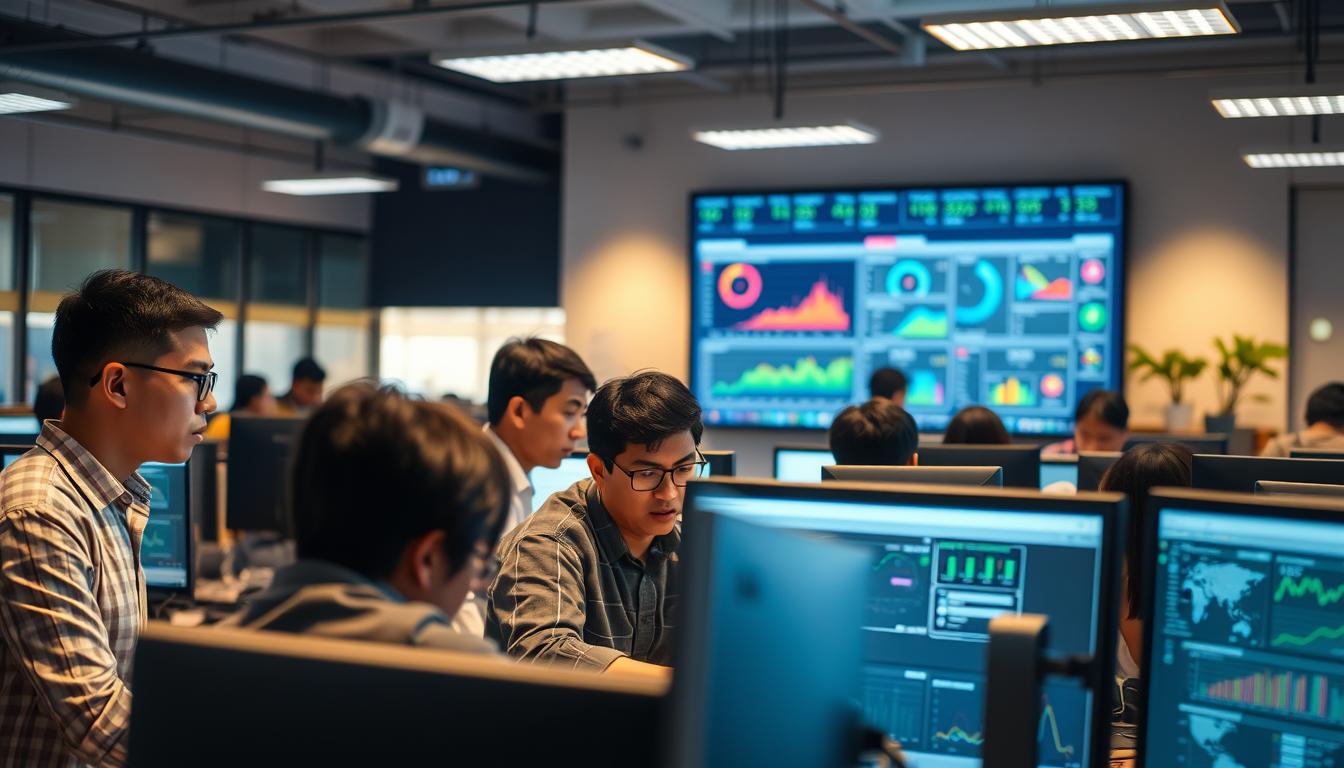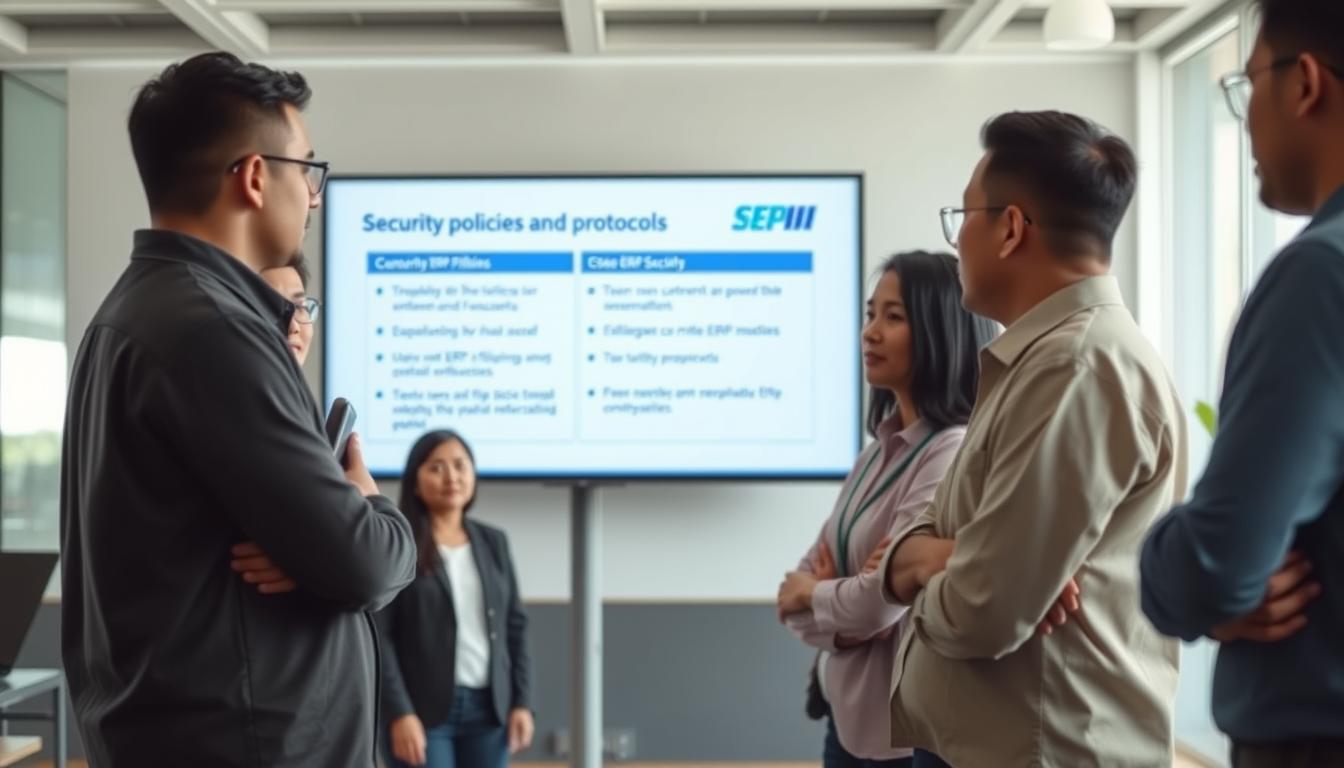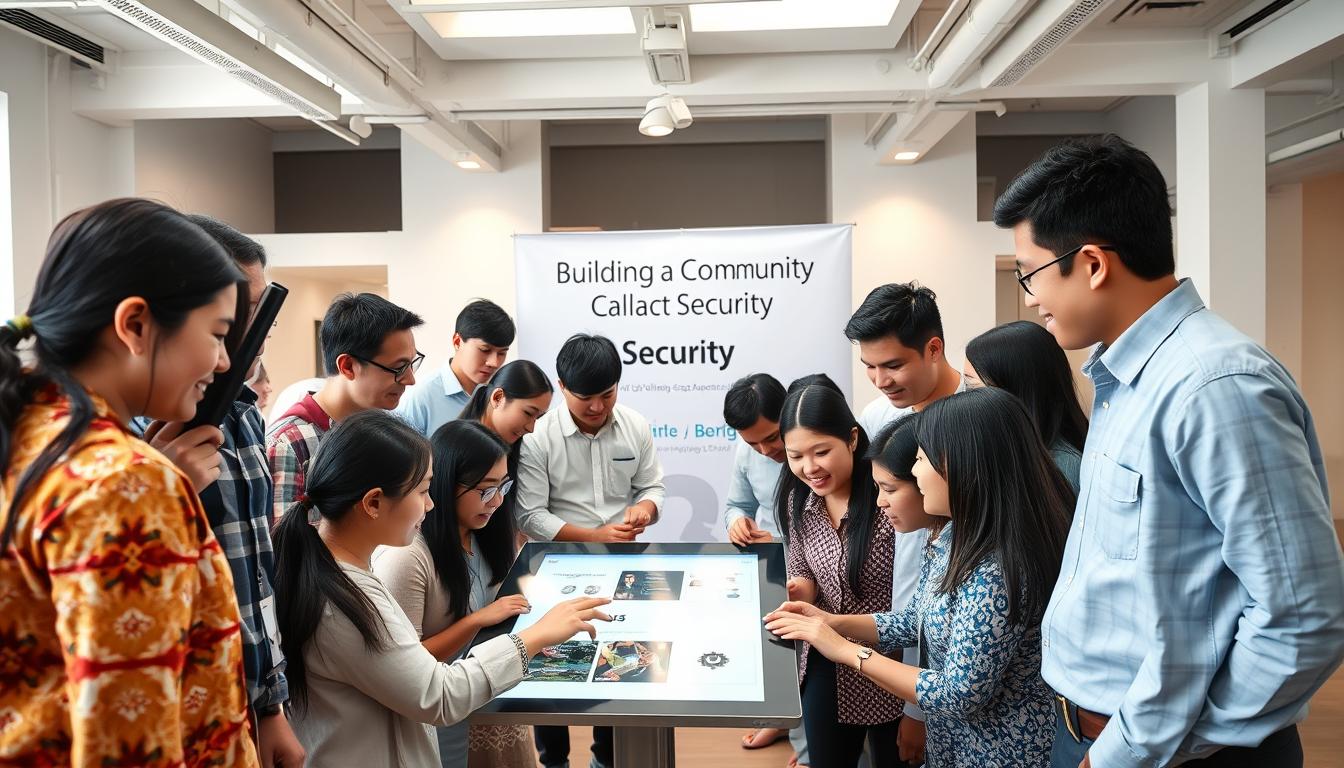Have you thought about how people affect your ERP security culture? In today’s fast-changing digital world, a strong ERP security culture is key. This article will help small and medium enterprises in the Philippines build a solid security culture.
This culture focuses on more than just technology. It also highlights the importance of user awareness and everyone’s role in keeping data safe. By understanding that both technology and human actions are crucial, you can protect your data and keep your business running smoothly.
Key Takeaways
- Recognizing the pivotal role of user awareness in maintaining ERP security.
- Understanding that a strong ERP security culture goes beyond technology.
- Emphasizing collective responsibility for safeguarding sensitive data.
- Exploring actionable strategies tailored for SMEs in the Philippines.
- Adopting a holistic approach that incorporates human behavior into security practices.
Understanding ERP Security Culture
Creating a strong ERP security culture is key in today’s digital world. It’s about making sure everyone in your company knows how to protect sensitive data. This means regular training and keeping everyone informed.
Importance of a Strong Security Foundation
A solid security foundation is the core of a good ERP security culture. It needs constant training and clear communication. In the Philippines, adding security training to new employee onboarding is a smart move. It sets the stage for a culture where security is everyone’s responsibility.
Differences Between Security Culture and Compliance
It’s important to know the difference between security culture and compliance. Compliance is about following rules, while security culture is about everyone working together to keep things safe. Small businesses need to understand that following rules doesn’t always mean you’re safe without a strong security culture.
Recognizing Common Risks in ERP Systems
It’s vital to know about common ERP risks to protect sensitive info and keep operations running smoothly. Threats like phishing attacks and internal threats can harm an organization’s data security. Teaching employees how to spot and stop these risks is key.
Phishing and Malware Attacks
Phishing attacks have become more complex, aiming to trick employees into sharing sensitive info. These scams look like real emails but ask you to click on harmful links. It’s important for sales and inventory teams to learn how to spot these scams.
Regular training helps protect against phishing. For more info, check out this resource on protecting employee data.
Internal Security Threats
Internal threats are just as dangerous as external ones. Employees might accidentally leak data because they don’t know the security rules. Companies must have strict access controls and train employees well.
Teaching employees about the dangers of internal threats helps prevent security breaches. This way, organizations can keep their data safe.
Educating Employees on Security Best Practices
Teaching employees about security is key to keeping your company safe. Offering ongoing learning helps them spot dangers early. This way, they can protect your business better.
Having a plan for training and easy-to-use resources is important. It makes everyone more aware of security risks.
Regular Training Sessions
Regular training is crucial for a security-aware team. Topics like password safety, data protection, and phishing should be covered. Using local examples in the Philippines makes these lessons more relatable.
Keeping employees up-to-date with security news is also vital. This keeps them ready for new threats.
Creating Easy-to-Understand Resources
It’s important to make learning easy for everyone. Using infographics, videos, and interactive tools helps. This way, everyone can understand security concepts better.
By making materials fit the Philippine culture, you get more engagement. This leads to a stronger team commitment to security.
Empowering Employees to Take Ownership
Employee empowerment is key to a proactive security culture. It encourages employees to take charge of security. This way, security issues get solved quickly and well.
This empowerment makes employees more alert to threats. They become better at spotting vulnerabilities in ERP systems.
Encouraging Reporting of Security Issues
It’s important to have a safe space for employees to share security concerns. When they feel safe, they help build a culture of vigilance. This is good for everyone.
Clear rules on how to report issues are needed. They help employees know how to share concerns about ERP system vulnerabilities.
Recognizing Positive Security Behaviors
It’s good to recognize employees who show positive security behaviors. This shows how important they are in protecting company data. It motivates them to focus on ERP security.
This creates a team spirit where everyone feels appreciated. They know their efforts keep the workplace safe.
Engaging Employees through Open Communication
Keeping employees engaged is key to a strong security culture. Open communication makes sure they feel valued and heard. It helps address security concerns and promotes a proactive security approach.
Creating Feedback Mechanisms
Feedback mechanisms let employees share their thoughts on security. Tools like anonymous surveys or suggestion boxes encourage open talk. This makes employees feel safe to share their concerns.
By listening to feedback, companies can improve security. This leads to better security measures that fit the organization’s needs.
Collaborating on Security Solutions
Getting employees involved in security planning boosts engagement and compliance. When they help create user-friendly policies, they feel more invested. This teamwork builds trust and makes security a priority.
Companies should work together to tackle security challenges. This ensures they stay ahead of new risks.
| Feedback Mechanism | Benefits |
|---|---|
| Anonymous Surveys | Fosters open communication, increases response rate |
| Feedback Sessions | Encourages dialogue, builds trust among team members |
| Suggestion Boxes | Provides a platform for honest feedback, promotes continuous improvement |
| Workshops | Engages teams in security discussions, enhances knowledge |
Implementing Continuous Monitoring and Evaluation
In today’s fast-changing cybersecurity world, a strong security approach is key for ERP systems. Continuous monitoring helps organizations tackle vulnerabilities early on. Regular checks and audits boost their cybersecurity stance.
Conducting Regular Security Audits
Regular security audits are vital for spotting ERP system vulnerabilities. Companies can hire local cybersecurity firms for detailed audits. This step helps find security gaps and check if they follow rules.
Setting Measurable Security Goals
Setting clear goals helps track the success of security efforts. By setting specific targets, like lowering phishing attempts or data breaches, progress can be seen. These goals help improve training and security readiness.
| Metric | Goal | Current Status | Action Plan |
|---|---|---|---|
| Reported Phishing Attempts | Reduce by 20% in 6 months | 50 attempts | Enhance training programs |
| Data Breach Incidents | Zero incidents in 12 months | 3 incidents | Implement stronger access controls |
| Employee Awareness Level | Achieve 90% training completion | 70% | Schedule additional training sessions |
Post-Implementation Support for Sustaining Security Culture
Post-implementation support is key to keeping a strong security culture in ERP systems. Companies must focus on ongoing training. This keeps employees up-to-date with new security threats and practices.
Regular updates on security policies help staff stay in line with expectations. This keeps everyone on the same page.
Setting up support channels is also crucial. It lets employees get help with security issues. This creates a culture of openness and alertness.
In the Philippines, mentorship programs can be very helpful. They pair experienced staff with newcomers. This helps in teaching the right way to use ERP systems securely.
A good plan for keeping security strong includes regular training, easy access to resources, and keeping employees involved. These steps help make protecting sensitive data a team effort.
Enforcing Security Policies Consistently
Keeping a strong security culture means sticking to policies that match the company’s goals. This makes sure everyone knows how important it is to protect sensitive info.
Updating Security Protocols Regularly
Security rules need to change with new threats and company updates. In the Philippines, it’s good to check these rules at least once a year. This keeps everyone up-to-date and helps them follow the latest security steps.
Addressing Violations Effectively
Talking openly about policy breaks helps make security rules stick. When people know what happens if they don’t follow the rules, they’re more likely to do so. This creates a place where everyone values honesty and safety, key for a secure ERP setup.
Evolving Your Security Strategies
In today’s digital world, companies must keep updating their security plans. They need to know about new cyber threats like phishing and ransomware. It’s crucial to stay alert and keep security measures up to date to protect important data.
Adapting to New Cyber Threats
The world of cybersecurity is always changing. Filipino SMEs need to stay on top of new threats. Training employees helps them spot risks early. By updating security plans with the latest info, businesses can stay safe.
Incorporating New Technologies and Tools
Using new tech can make ERP systems more secure. For example, AI can find threats quickly and respond fast. By trying out new tools, companies can keep their data safe and ready for any attack.
Building a Community of Security Awareness
Creating a culture of security in an organization is more than just policies. It’s about making everyone aware and involved. This means sharing what works and learning from others.
Sharing Success Stories and Insights
Sharing success stories in security boosts morale. When employees see what works, they want to help. It shows the value of everyone’s role in keeping things safe.
Involving External Experts for Better Perspectives
Bringing in outside cybersecurity experts is key. They bring new ideas and strategies. This helps the company stay ahead in security, helping everyone do their part.
Conclusion
Building a culture of security in ERP systems is key for Filipino SMEs to fight cyber threats. Teaching and empowering employees makes a big difference. This way, sensitive data stays safe from hackers.
Regular checks on security help companies stay ahead of new threats. This keeps their data and systems safe.
Creating a strong security culture also makes businesses more efficient. It builds trust with clients and partners. This is vital in the fast-paced world of ERP.
Keeping security in mind is essential for success in today’s digital age. It helps businesses grow and stay competitive.
Building a security culture is a long-term effort. By making security a core value, Filipino SMEs can face future challenges better. They also enjoy the benefits of a secure work environment.
FAQ
What is ERP security culture?
ERP security culture is about how a company protects its data and keeps its systems running smoothly. It’s more than just following rules. It’s about everyone working together to keep things safe.
Why is having a strong security foundation important?
A solid security foundation is key for a good ERP security culture. It means everyone gets trained and knows how to stay safe. This training is part of starting new employees off right.
How can employees help prevent phishing and malware attacks?
Employees can stop phishing and malware by learning to spot fake emails and links. Knowing about common cyber threats helps keep the company’s data safe.
What are some internal security threats?
Internal threats come from employees who might not know better. It’s important to teach them about security and the dangers of mishandling information. This helps prevent problems.
How often should security training sessions occur?
Security training should happen regularly. This keeps everyone up to date on new threats and how to avoid them. It’s important to keep the training going to keep the culture strong.
What types of resources can help employees understand security better?
There are many resources to help employees get security. Things like infographics, videos, and materials in different languages can help everyone understand. This makes security more accessible and interesting.
Why is it important to encourage reporting of security issues?
Encouraging people to report security problems is important. It makes everyone more alert and helps everyone feel like they’re working together. Clear guidelines make it easier for employees to share their concerns.
How can companies recognize positive security behaviors?
Companies can reward employees for good security habits. This encourages everyone to focus on keeping information safe. It helps build a culture that values security.
What role do feedback mechanisms play in security culture?
Feedback, like anonymous surveys, lets employees share their thoughts on security. This open communication helps improve security practices. It makes the company more responsive to security needs.
How can organizations conduct effective security audits?
Companies can hire local cybersecurity firms to check their systems. These audits find weaknesses and help improve security. They make sure the company is following the right rules.
What is the significance of setting measurable security goals?
Setting clear security goals helps measure success. By tracking things like phishing attempts, companies can see how well they’re doing. This helps improve training and security.
How should security protocols be maintained?
Security rules should be updated regularly. This keeps the company safe from new threats. It’s important to stay current with security measures.
What should be done in response to security violations?
It’s important to have a clear plan for when security rules are broken. This helps fix problems and keeps everyone’s trust. It shows that the company takes security seriously.
Why is adapting to new cyber threats important?
Keeping up with new cyber threats is crucial. Cybersecurity is always changing. Staying informed helps the company stay ahead of threats.
What technologies can enhance ERP security?
New technologies, like AI for threat detection, can make ERP systems safer. Exploring new tools is important for protecting data in the long run.
How can sharing success stories impact security culture?
Sharing stories of successful security efforts can inspire everyone. It makes people feel like they’re part of a team working towards a common goal. It motivates employees to contribute to security.
Why should firms involve external experts in security strategies?
Working with cybersecurity experts brings new ideas and knowledge. It helps companies stay up to date with the latest security practices. Local experts can offer advice tailored to the company’s needs.



